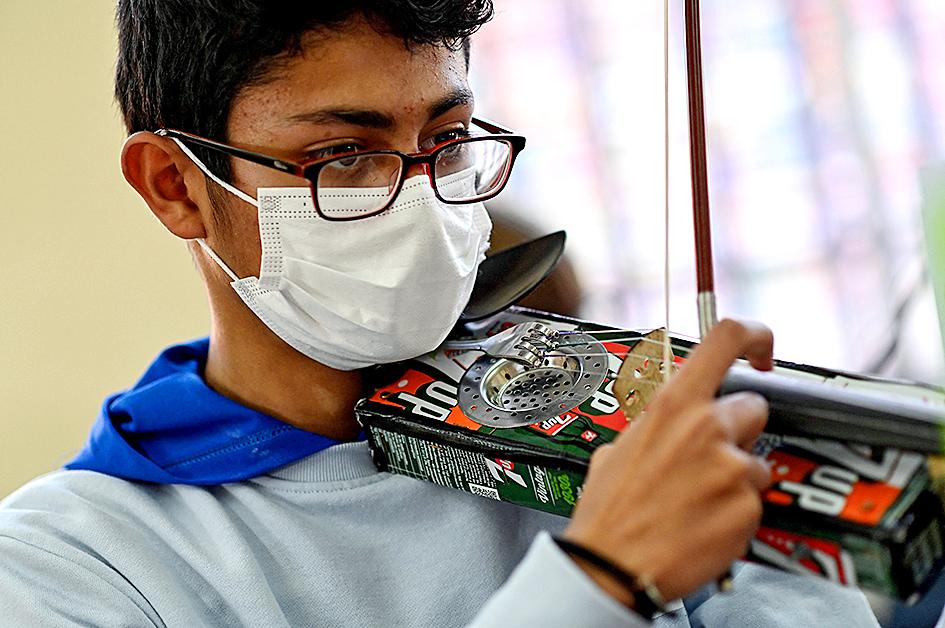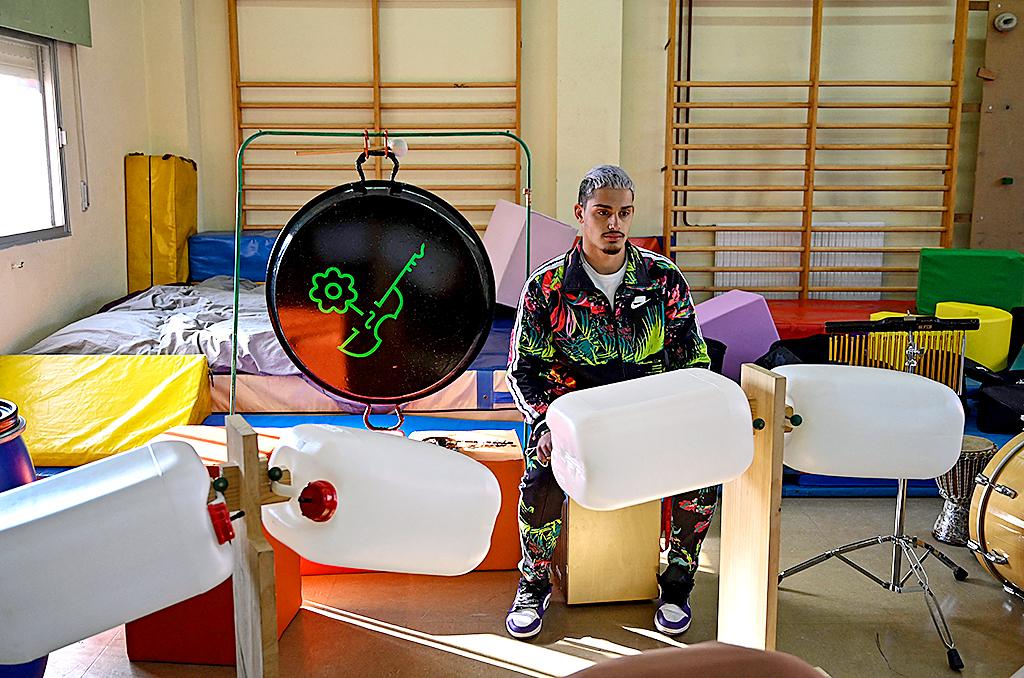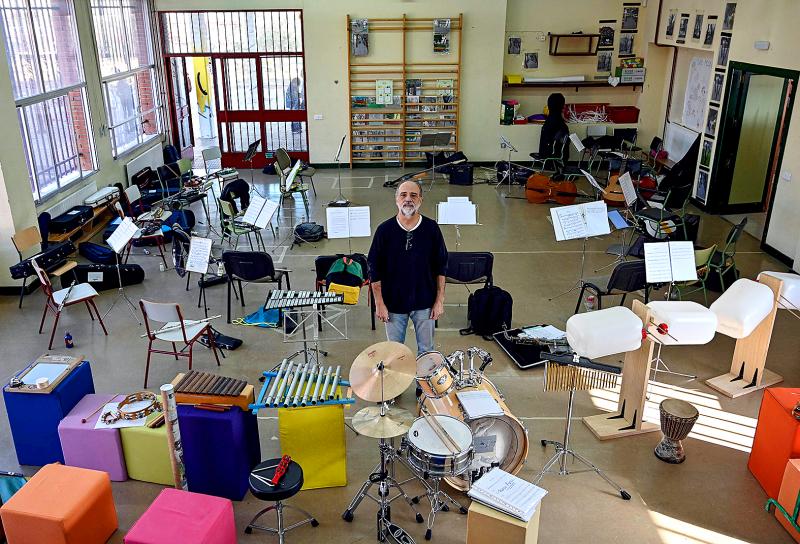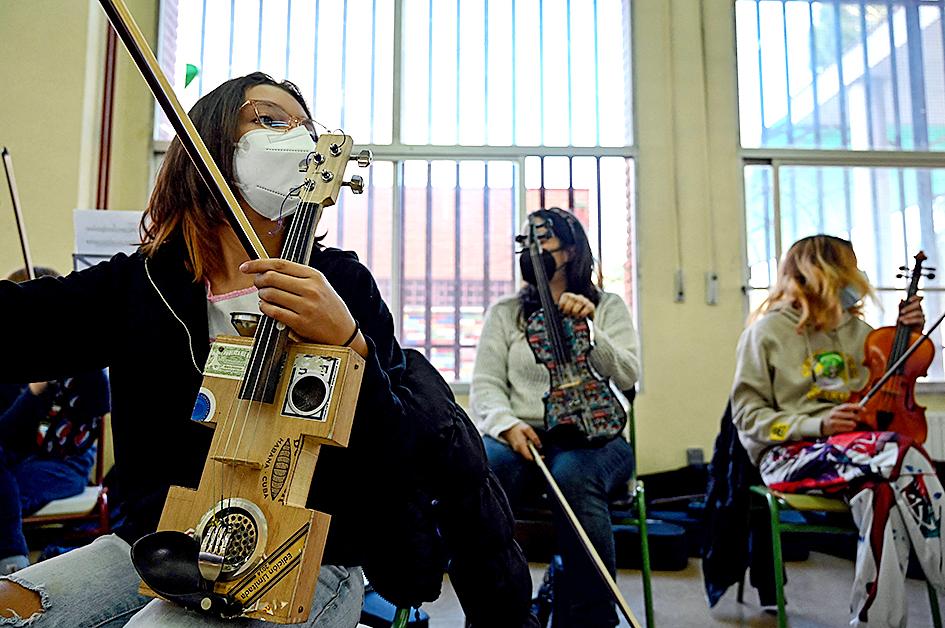Cristina Vazquez, a Roma teen who grew up in a Madrid shantytown, never imagined herself playing the violin.
But today she is first violinist in an inventive orchestra bringing together two dozen disadvantaged youths, using instruments made from recycled materials.
Her violin is made from colorful soda cans, while a string bass has a skateboard for its body, and drums are made from plastic barrels.

Photo: AFP
The project, dubbed “Music of Recycling,” aims to breathe new life into discarded junk while also benefiting youths from disadvantaged backgrounds.
“I am really happy, because it has changed my life a lot,” said 18-year-old Vazquez, her eyes gleaming.
She hesitantly joined the orchestra at age 12 when it was part of the curriculum at her school in the southern district of Vallecas, one of Madrid’s poorest neighborhoods.

Photo: AFP
Today she teaches younger members of the group.
“The orchestra has really opened me up to the world... I had never even gone to the center of Madrid,” she said.
“I don’t know if I will become a professional musician ... but I want to keep giving classes to young children.

Photo: AFP
“It fills you with pride when a young girl comes up to you and says: ‘When I grow up I want to be like you.’”
Luis Miguel Munoz, 18, credits the orchestra with keeping him on the straight and narrow in a neighborhood like Vallecas, which has a high school dropout rate.
“Instead of meeting up with friends, I preferred to listen to music, play it, and little by little it became a way of life,” he said.

Photo: AFP
Belonging to an orchestra is like “being in a family, and doing what pleases us most,” said the bleach-blond Munoz, who sports a goatee.
Music “allowed me to escape life’s problems,” said Munoz, who sees himself becoming a professional flamenco percussionist.
The project is run by Spanish environmental group Ecoembes and is inspired by Paraguay’s Cateura orchestra, made up of musicians from a slum who play instruments made from materials found in a rubbish dump.
After Ecoembes invited the Cateura orchestra to perform in Madrid in 2014, the group decided to found its own similar ensemble that same year, said Victor Gil, the director of Music of Recycling.
“Why not here? We have social and economic problems,” the Argentinian said.
The ensemble put on its first concert just four months later and “the kids could not play more than four notes,” said Gil, who plays the bass made from a skateboard.
Now after having performed in cities across Spain, “we already have four boys studying in scholarships at music schools and public conservatories,” he added.
Unfortunately, the pandemic has put a temporary halt to performances. A concert planned for last Thursday in Madrid was called off at the last minute because of soaring COVID-19 infections in Spain.
Meanwhile, more than 100 children are taking music classes from members of the orchestra as part of the project.
The instruments are created by luthier Fernando Soler, a third-generation instrument maker, from cans, wooden boxes, cutlery and parts of discarded instruments.
He said he tries to make the instruments as close to their “normal” shape as possible so the children won’t have difficulty playing regular equipment in the future.
Soler hopes he will soon be able to restart his workshops on making instruments, which were suspended because of the pandemic. He said his dream is to see one of his pupils become “the luthier of recycling of the future.”

The canonical shot of an East Asian city is a night skyline studded with towering apartment and office buildings, bright with neon and plastic signage, a landscape of energy and modernity. Another classic image is the same city seen from above, in which identical apartment towers march across the city, spilling out over nearby geography, like stylized soldiers colonizing new territory in a board game. Densely populated dynamic conurbations of money, technological innovation and convenience, it is hard to see the cities of East Asia as what they truly are: necropolises. Why is this? The East Asian development model, with

June 16 to June 22 The following flyer appeared on the streets of Hsinchu on June 12, 1895: “Taipei has already fallen to the Japanese barbarians, who have brought great misery to our land and people. We heard that the Japanese occupiers will tax our gardens, our houses, our bodies, and even our chickens, dogs, cows and pigs. They wear their hair wild, carve their teeth, tattoo their foreheads, wear strange clothes and speak a strange language. How can we be ruled by such people?” Posted by civilian militia leader Wu Tang-hsing (吳湯興), it was a call to arms to retake

This is a deeply unsettling period in Taiwan. Uncertainties are everywhere while everyone waits for a small army of other shoes to drop on nearly every front. During challenging times, interesting political changes can happen, yet all three major political parties are beset with scandals, strife and self-inflicted wounds. As the ruling party, the Democratic Progressive Party (DPP) is held accountable for not only the challenges to the party, but also the nation. Taiwan is geopolitically and economically under threat. Domestically, the administration is under siege by the opposition-controlled legislature and growing discontent with what opponents characterize as arrogant, autocratic

When Lisa, 20, laces into her ultra-high heels for her shift at a strip club in Ukraine’s Kharkiv, she knows that aside from dancing, she will have to comfort traumatized soldiers. Since Russia’s 2022 invasion, exhausted troops are the main clientele of the Flash Dancers club in the center of the northeastern city, just 20 kilometers from Russian forces. For some customers, it provides an “escape” from the war, said Valerya Zavatska — a 25-year-old law graduate who runs the club with her mother, an ex-dancer. But many are not there just for the show. They “want to talk about what hurts,” she